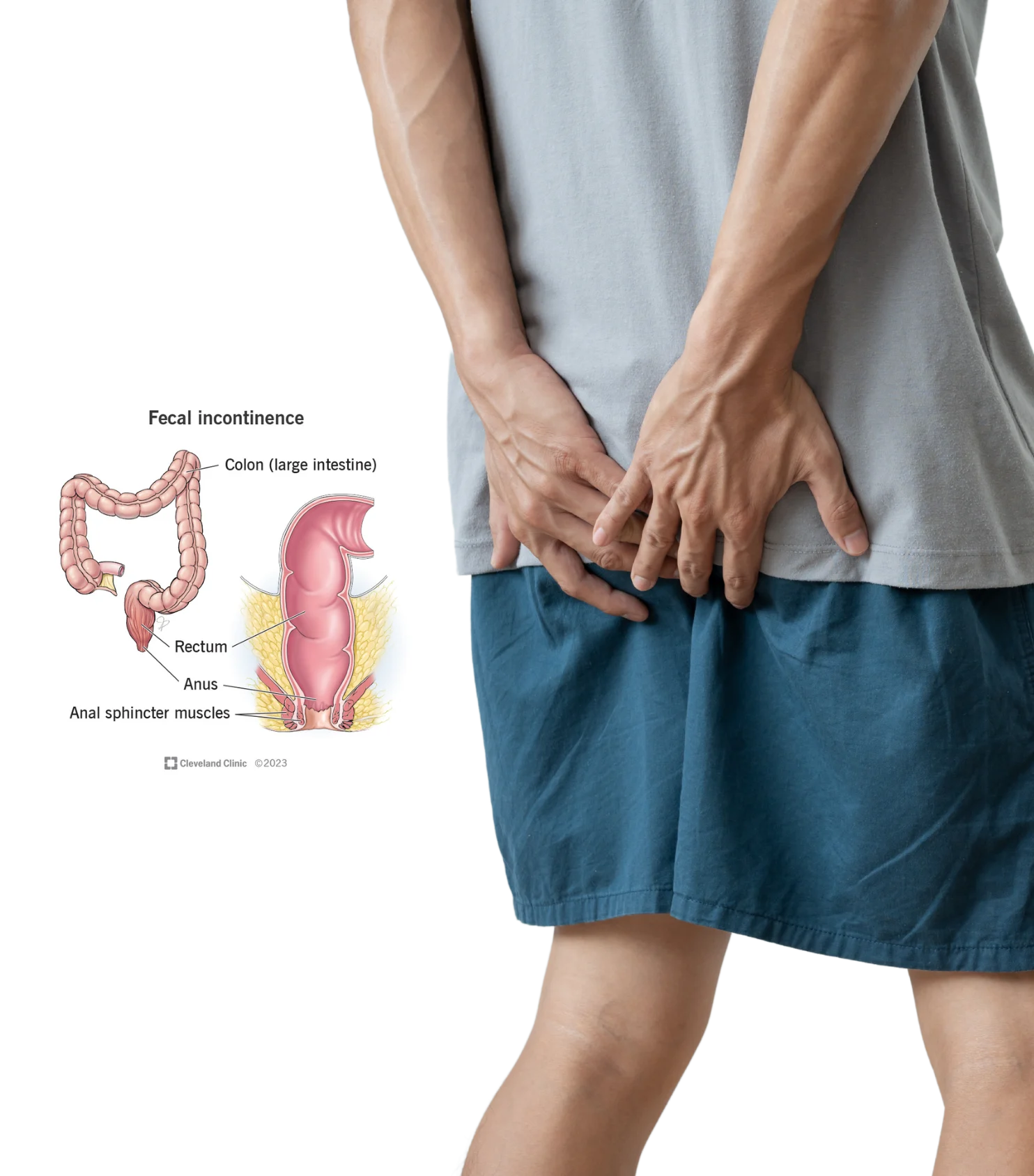
Fecal Incontinence Treatment Hyderabad: Expert Solutions at Lux Hospitals
Fecal incontinence is a demanding disorder that shatters regular routines and impacts emotional health. Where Hyderabad’s best faecal incontinence treatment is necessary, Lux Hospitals takes the lead with compassionate, advanced medical care.
Our proctology specialist experts offers detailed faecal incontinence treatment solutions tailored to reach every conceivable area of the disease. Whether you experience occasional leakage or more serious symptoms, we aim to regain dignity and enhance your quality of life through customized fecal incontinence treatment plans.
What is Fecal Incontinence?
Fecal incontinence is the loss of control over bowel movements, resulting in involuntary leakage of stool. It may range from involuntary leakage with a passing gas to loss of total bowel control. Understanding the reasons and symptoms allows for proper management and treatment of fecal incontinence.
Types of Fecal Incontinence
- Urgent Incontinence: By a strong, overwhelming sense to have a bowel movement and leakage prior to actually getting on the toilet.
- Passive Incontinence: Leakage is unknown to the patient.
- Overflow Incontinence: Usually due to chronic constipation, when the rectum is overly entire and stool leaks out.
Determining what type of fecal incontinence an individual has is the initial step to employing the most effective fecal incontinence treatment.
Causes of Fecal Incontinence
- Muscle Damage: Damage to the anal sphincter, either in birth or as a result of surgical procedures, is a frequent cause.
- Nerve Damage: Nerves can be injured as a result of diabetes, multiple sclerosis, or damage to the spine, which will make fecal incontinence more difficult to treat.
- Chronic Constipation or Diarrhea: Prolonged bowel disease will weaken muscles and disrupt nerve impulses necessary for normal bowel function.
- Aging: Diminishing of the pelvic floor muscles with age is another key issue to keep in mind.
- Rectal Prolapse: Rectal prolapse through the anus typically requires advanced fecal incontinence therapy.
- Hemorrhoids: Swollen veins in the rectum can create interference with the closure of the anus, hence the issue.
By understanding these causes of fecal incontinence, our experts can provide fecal incontinence treatment that is individualized to address your needs.
Symptoms of Fecal Incontinence
- Uncontrolled Leaking: Spontaneous leakage during daily living.
- Urgency: Spontaneous, uncontrollable urgency to have a bowel movement.
- Repeated Bowel Accidents: Habitual or occasional setbacks that interfere with social and working life.
- Discomfort and Tickling: Discomfort and tickling around the anus.
Treatment Options for Fecal Incontinence
Non-Surgical Fecal Incontinence Treatment
- Drugs: Anti-diarrheal medications, fiber supplements, or laxatives can be prescribed based on the underlying cause. These medications are a crucial component of fecal incontinence treatment.
- Biofeedback Therapy: This is a method in which sensors and visual feedback are utilized to teach patients the ways to contract their pelvic muscles, and it is an extremely useful non-surgical fecal incontinence treatment.
- Electrical Stimulation: Mild electrical currents can be used to strengthen the anal sphincter, thus complementing fecal incontinence therapy.
- Bulking Agents: Implants or injections will thicken anal canal walls and offer more support and control as part of a complete fecal incontinence treatment regimen.
The above non-surgical alternatives ensure the delivery of fecal incontinence treatment to individuals who do not wish to go under the surgeon’s knife.
Surgical Fecal Incontinence Treatment
- Drugs: Anti-diarrheal medications, fiber supplements, or laxatives can be prescribed based on the underlying cause. These medications are a crucial component of fecal incontinence treatment.
- Biofeedback Therapy: This is a method in which sensors and visual feedback are utilized to teach patients the ways to contract their pelvic muscles, and it is an extremely useful non-surgical fecal incontinence treatment.
- Electrical Stimulation: Mild electrical currents can be used to strengthen the anal sphincter, thus complementing fecal incontinence therapy.
- Bulking Agents: Implants or injections will thicken anal canal walls and offer more support and control as part of a complete fecal incontinence treatment regimen.
The above non-surgical alternatives ensure the delivery of fecal incontinence treatment to individuals who do not wish to go under the surgeon’s knife.
Management of Fecal Incontinence
- Dietary Modification: Higher fibre intake and proper hydration maintain bowel movement control and enhance stool consistency.
- Pelvic Floor Exercises: Exercise to strengthen the muscles, e.g., Kegel exercises, can strengthen the muscles controlling the bowel, playing an integral role in fecal incontinence management.
- Scheduled Bowel Movements: Conditioning your body to have a regular routine will decrease surprise accidents.
This comprehensive fecal incontinence treatment plan is only one component of our full fecal incontinence treatment program at Lux Hospitals.

Dr Samhitha Reddy
MBBS, MS, FMAS, FISCP, DMAS
Speciality : Colorectal Surgeon & Proctologist
Experience : 8 years

Dr Abhishek Katha
MBBS, MS, FMAS, FISCP, DMAS
Speciality : General and Laparoscopic Surgeon
Experience : 16 years
Why Choose Lux Hospitals for Fecal Incontinence Treatment in Hyderabad?
- Expert Team: Our top proctologists in Hyderabad offer individualized care that considers the physical and psychological nature of the condition.
- Advanced Technology: We offer the latest diagnostic and treatment methods to ensure successful fecal incontinence treatment with less pain.
- Comprehensive Care: From diagnosis and fecal incontinence symptoms to managing long-term fecal incontinence, our multidisciplinary care program addresses every step of your recovery.
- Minimally Invasive Procedure: All our non-surgical fecal incontinence therapies are designed to provide minimal downtime and quick healing.
- Patient-Centred Care: We strive to restore your quality of life by providing empathetic, humble, and effective therapy for fecal incontinence.
Our intent is to produce a supportive environment where each patient gets total support and care when undergoing fecal incontinence treatment.

Dr Samhitha Reddy
MBBS, MS, FMAS, FISCP, DMAS
Speciality : Colorectal Surgeon & Proctologist
Experience : 8 years

Dr Abhishek Katha
MBBS, MS, FMAS, FISCP, DMAS
Speciality : General and Laparoscopic Surgeon
Experience : 16 years
LUXGPT : Your One message Away Companion

Healthcare, simplified—everything you need in one place. From sharing medical reports to getting answers about insurance or doctor consultations, just send a quick text or voice note for instant support.










